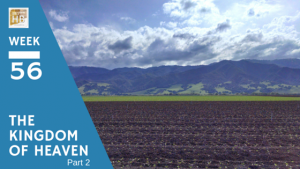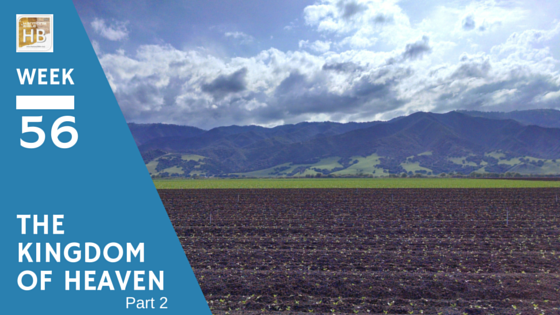Week 56 | Sections 64c,d,e
 Last week we introduced this series of parables about the Kingdom of Heaven which Jesus told his disciples over the course of a very long day (section 61-65). In part two we learn with the disciples a bit more about the end of times, the perseverance, pains, and perils along the journey.
Last week we introduced this series of parables about the Kingdom of Heaven which Jesus told his disciples over the course of a very long day (section 61-65). In part two we learn with the disciples a bit more about the end of times, the perseverance, pains, and perils along the journey.
Scripture:
Section 64c | Mark 4:26-29
26 He said, “God’s Kingdom1 is as if a man should cast seed on the earth, 27 and should sleep and rise night and day, and the seed should spring up and grow, though he doesn’t know how.2¯3¯4 28 For the earth bears fruit: first the blade, then the ear, then the full grain in the ear. 29 But when the fruit is ripe, immediately he puts in the sickle, because the harvest has come.”5
Section 64d | Matthew 13:24-30
24 He set another parable before them, saying, “The Kingdom of Heaven is like a man who sowed good seed in his field, 25 but while people slept, his enemy came and sowed darnel weeds also among the wheat, and went away. 26 But when the blade sprang up and produced fruit, then the darnel weeds appeared also. 27 The servants6 of the householder came and said to him, ‘Sir, didn’t you sow good seed in your field? Where did these darnel weeds come from?’ 28 “He said to them, ‘An enemy7 has done this.’ “The servants asked him, ‘Do you want us to go and gather them up?’ 29 “But he said, ‘No, lest perhaps while you gather up the darnel weeds, you root up the wheat with them. 30 Let both grow together until the harvest, and in the harvest time I will tell the reapers, “First, gather up the darnel weeds, and bind them in bundles to burn them; but gather the wheat into my barn.” ’ ”
[one_half last=”no”]Section 64e | Matthew 13:31-32
31 He set another parable before them, saying, “The Kingdom of Heaven is like a grain of mustard seed, which a man took, and sowed in his field; 32 which indeed is smaller than all seeds. But when it is grown, it is greater than the herbs, and becomes a tree, so that the birds of the air come and lodge in its branches.”8[/one_half]
[one_half last=”yes”]Mark 4:30-32
30 He said, “How will we liken God’s Kingdom? Or with what parable will we illustrate it? 31 It’s like a grain of mustard seed, which, when it is sown in the earth, though it is less than all the seeds that are on the earth, 32 yet when it is sown, grows up, and becomes greater than all the herbs, and puts out great branches, so that the birds of the sky can lodge under its shadow.”9[/one_half]
Group Dialog:
- Why is the idea of the Kingdom Heaven so important?
- If not for the Kingdom of Heaven, why do you live, labor, and love?
- What would you like to change now to ensure your spiritual vitality and viable service for the Kingdom and purposes of God?
Learning Objectives:
The importance of our heavenly priority, spiritual disciplines to further our spiritual vitality and service in ministry, the hope of heaven.
Photo: An organic field in the Salinas Valley, CA. There they rotate crops to enrich the soil, they till the soil, prepare the field for each crop, sow the seeds, send out the laborers week after week to maintain the crop for a bountiful harvest.
Study Notes:
- Hebrew teaching is primarily focused on life as the people of God in this earthly life and in community with one another. There is not much dogma about the afterlife, and though it affirms life after death and the justice of God (Lev. 26:3-9 and Deut. 11:13-15) it leaves room for personal opinion as to what will take place. The prophets spoke of the Messiah, but popular belief was that he would come as a military power not a carpenters son, and laborers which would help him build the Kingdom of God through the proclamation of the Good News. Hebrew teachers also spoke of the end times (Dan. 12:2, Neh. 9:5); and the “World to Come” (Olam Ha-Ba), with some measure of justice and ongoing transformation ushered in by the Messiah. They taught that there was “the place of spiritual perfection” (Gan Eden) for the righteous; “a place of purification” (Gehinnom, Gehenna) for the unrighteous; and “a place for punishment” (She’ol) for the “utterly wicked”. Still the details of bodily resurrection was in fact a matter of debate between the Sadducees and the Pharisees. In this light, it is no wonder Jesus offers his disciples such an extensive lesson on the subject of Heaven and the importance of their focus on the Kingdom. Judaism place an emphasis on “how to get into heaven”, rather on life and how to live it. Obedience is out of love and duty to God, not to get something in return. The Torah’s views on ethics and personal relationships is of much greater importance. Pirkei Avot, a book of the Mishnah, offers this to bit of advice: “Be not like servants who serve their master for the sake of receiving a reward; instead, be like servants who serve their master not for the sake of receiving a reward, and let the awe of Heaven be upon you.”
- Remember that we each have the responsibility and privilege of laboring with Christ for the purposes of God (1 Corinthians 3:6-9) yet it is Christ who has gone before us to save us all. By his stripes we are healed, cleansed, forgiven, and redeemed. He will help us mature and complete his work in us (Philippians 1:6). What a joy it is that we may share the Gospel, using those gifts bestowed to us, and be his disciples together with those with whom we disciple (John 4:36-38).
- 1Pet 1:22-25; Philippians 1:9-11 articulate the earnest desire of the disciple for his disciples.
- There are however ways in which we can help the seed take root and not be snatched away. A sure place to begin is the ongoing spiritual cultivation of our hearts through abiding with and worshiping the Savior daily in prayer, study and communion with other members of his body throughout the church. Read Colossians 3.
- Read Col 1:1-14 (and the rest of the book for in it Paul offers edification and assurance. He reminds them of the grace that infills those who believe and abide in Christ, he speaks of heaven, the importance to study the Scriptures and pray. Paul commends the ministry of Epaphras who brought word of their faith and was most likely the disciple who first shared the Good News with the people there.
- For more pastoral instruction from the Apostle Paul to the elders among the disciples throughout modern-day Turkey read 1Pet 5:1-11.
- In truth the enemy can be those preconceived and ill-conceived thoughts are not in line with the Word of God, the Devil and his minions, or even those who teach false and corrupt doctrine (2 Corinthians 11:1-15)
- There are numerous examples of disciples who became like this mustard tree; like the disciple Timothy in Ephesus. Read 2Tim 4:1-8. Paul’s appreciation of Timothy is also seen in his remembrance of the words he had written him four years before “fight the good fight” (1Tim 6:12) and his use of the same to describe his life of ministry and faith “I have fought the good fight . . . finished the course . . . kept the faith” (2Tim 4:7).
- Some scholars also include Luke 13:18-19 but Thomas and Gundry have placed it in Section 110 within its context – Jesus’ discourse with the ruler of the synagogue who objected to Jesus healing the woman who had been crippled for 18 years, for it was the Sabbath.
